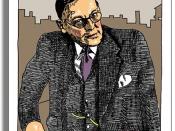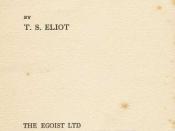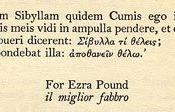In T.S. Eliot's "The Love Song of J. Alfred Prufrock," the author is establishing the problems the narrator is having with his coming of age. The narrator believes that age is a sort of burden and he is deeply troubled by it. This preoccupation with the passing of time characterizes his fear of aging, and this poem deals with that fear. The poem also deals with the narrator's fear of no longer being able to attain any kind of great love due to his age.
Prufrock feels unsure about himself throughout the entire poem. He is terrified of what might occur when people see his balding head or his aging body. He believes everyone will think he is old and useless. ("They will say: "How his hair is growing thin!) My morning coat, my collar mounting firmly to the chin,/ My necktie rich and modest, but asserted by a simple pin.(44)
This insecurity is definitely a hindrance for him, because it holds him back from doing the things he wishes to do. This is the sort of characteristic that makes Alfred into a tragic, doomed character in the text.
This sense of doom is present in the beginning in the epigraph which was borrowed from Dante's Inferno, which suggests that the only those who understand the fears that Prufrock embodies in the poem can actually understand what the true meaning of the text is, and those who do know will never be able to communicate the meaning to others. The mere fact that Eliot chose Inferno for his epigraph suggests a very strong undertone of misery. The poem is an internal monologue in which Prufrock reveals himself as lonely and timid, and as the epigraph suggests, miserable.
This misery seems to stem from Prufrocks age and societal pressures.


